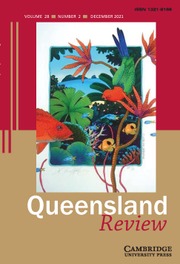No CrossRef data available.
Article contents
From Deserts the Marchers Come: Confessions of a Peripatetic Historian
Published online by Cambridge University Press: 26 February 2016
Extract
The whole country was trapped in a lie … We were the only truthtellers, as far as we could see. It seldom occurred to us to be afraid. We were sheathed in the fact of our position. It was partly our naiveté which allowed us to leap into this position of freedom, the freedom of absolute right action.
I wish I had said that. But it was written in 1988 by Casey Hayden, a female civil rights worker with the Student Nonviolent Coordinating Committee, or ‘Snick’, in the American South of the mid-1960s, remembering that horrific/heroic time of bombings and burnings. In Brisbane, a distant metropolis on the historical bypass, it was nothing as bad as that. No one was murdered — not right then anyway, though there would also be threats, beatings, bombing and arson attacks (and the odd trashing) of leftist personnel, headquarters and bookshops. There would be moments to be afraid. But there is a purer applicability in Hayden's words to the local experience. For there was indeed a whole country trapped in the lie of Vietnam, of ‘White Australia’, of Aboriginal segregative gulags, of the biological fixity of men's and women's uneven positionings, of the sanctity of an intense moral and political censorship, tighter here than just about anywhere in the West: a place where Anzac ruled, sport and politics never mixed and the yawning gulf between Australian values and Australian practices was rarely noticed. A whole traffic-snarl of lies and deception really, and we were the only truth-tellers as far as we could see.
- Type
- Part 1: Reflecting on the Era
- Information
- Copyright
- Copyright © Cambridge University Press
References
Notes
1 Hayden, Casey, ‘The Movement’, Witness, Summer/Fall (1988), quoted in Greil Markus, Invisible Republic. Bob Dylan's Basement Tapes (London: Picador, 1997), 210–11.Google Scholar
2 DeLillo, Don in conversation with Greil Markus, ‘The Genius of Rock Music is That it Matches the Cultural Hysteria Around It’, The Believer, June/July (2006), 77.Google Scholar
3 Wilde, Oscar, The Soul of Man Under Socialism, quoted in Philip Hoare, England's Lost Eden: Adventures in a Victorian Utopia (London: Harper Perennial, 2006), 437.Google Scholar




